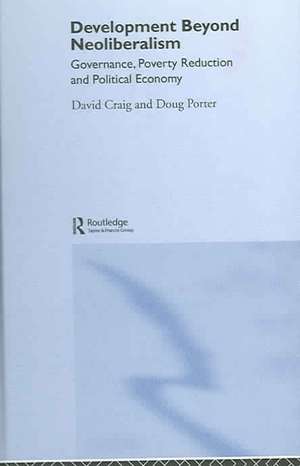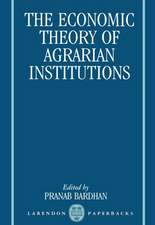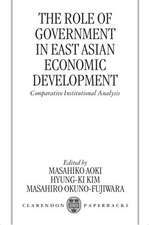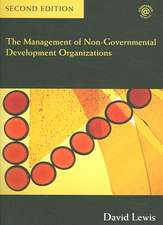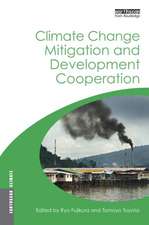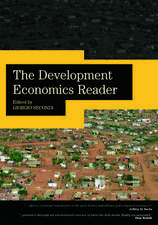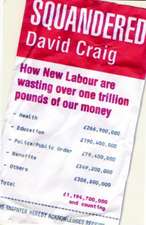Development Beyond Neoliberalism?: Governance, Poverty Reduction and Political Economy
Autor David Alan Craig, Doug Porteren Limba Engleză Hardback – 9 mar 2006
Taking a wider historical perspective, this book charts the emergence of poverty reduction and governance at the centre of development. It shows that the Poverty Reduction paradigm does indeed mark a shift in the wider liberal project that has underpinned development: precisely what is new, and what this means for how the poor are governed, are described here in detail.
This book provides a compelling history of development doctrine and practice, and in particular offers the first comprehensive account of the last twenty years, and development’s shift towards a new political economy of institution building, decentralized governance and local partnerships. The story is illustrated with extensive case studies from first hand experience in Vietnam, Uganda, Pakistan and New Zealand.
| Toate formatele și edițiile | Preț | Express |
|---|---|---|
| Paperback (1) | 477.70 lei 6-8 săpt. | |
| Taylor & Francis – 2 mar 2006 | 477.70 lei 6-8 săpt. | |
| Hardback (1) | 1279.82 lei 6-8 săpt. | |
| Taylor & Francis – 9 mar 2006 | 1279.82 lei 6-8 săpt. |
Preț: 1279.82 lei
Preț vechi: 1560.76 lei
-18% Nou
Puncte Express: 1920
Preț estimativ în valută:
244.93€ • 254.76$ • 202.20£
244.93€ • 254.76$ • 202.20£
Carte tipărită la comandă
Livrare economică 15-29 aprilie
Preluare comenzi: 021 569.72.76
Specificații
ISBN-13: 9780415319591
ISBN-10: 0415319595
Pagini: 352
Ilustrații: 8 b/w images, 18 tables and 8 line drawings
Dimensiuni: 156 x 234 x 24 mm
Greutate: 0.66 kg
Ediția:1
Editura: Taylor & Francis
Colecția Routledge
Locul publicării:Oxford, United Kingdom
ISBN-10: 0415319595
Pagini: 352
Ilustrații: 8 b/w images, 18 tables and 8 line drawings
Dimensiuni: 156 x 234 x 24 mm
Greutate: 0.66 kg
Ediția:1
Editura: Taylor & Francis
Colecția Routledge
Locul publicării:Oxford, United Kingdom
Public țintă
Postgraduate and UndergraduateCuprins
1. Governing Poverty: Development Beyond Neoliberalism? Part 1: Liberal Development and Governance from Free Trading to ‘Neoliberal Institutionalism’ 2. The Historical Hybrids of Liberal and Other Development, c1600–1990: Markets Territory and Security in Development Retrospect 3. The Rise of Governance Since 1990: The Capable State, Poverty Reduction and 'Inclusive' Neoliberalism 4. Local Institutions for Poverty Reduction? 1997-2005: Re-Imagining a Joined-Up, Decentralised Governance Part 2: Cases from Vietnam, Uganda, Pakistan and New Zealand 5. Vietnam: Framing the Community, Clasping the People 6. Uganda: Telescoping of Reforms, Local-Global Accommodation 7. Pakistan: A Fortress of Edicts 8. New Zealand: Joining up Governance after New Institutionalism 9. Conclusions: Accountability and Development Beyond Neoliberalism?
Recenzii
"For over a decade the consensus about how to do Development has focused on market liberalization, overarching juridical and public sector reform, and local participation in service delivery. Development Beyond Neoliberalism? mounts a frontal challenge to this consensus, using an unusual mix of empirical arguments. Recommended for the prejudiced and unprejudiced alike." Robert Hunter Wade, Professor of Political Economy, Development Studies Institute, London School of Economics
"This book vividly exposes the poverty of neoliberal development agenda at all its levels - economic, political, and social - through a powerful and sophisticated mixture of history, theory, and detailed empirical studies. It is a major achievement." Ha-Joon Chang. Assistant Director of Development Studies. Faculty of Economics, Cambridge University.
'This well-written book would be a useful stand-alone text for advanced undergraduates or a companion volume for graduate students. Students interested in development from disciplines such as geography, anthropology, sociology or international studies would fi nd this volume useful. ' Rob Krueger, Urban Studies Journal
"This book vividly exposes the poverty of neoliberal development agenda at all its levels - economic, political, and social - through a powerful and sophisticated mixture of history, theory, and detailed empirical studies. It is a major achievement." Ha-Joon Chang. Assistant Director of Development Studies. Faculty of Economics, Cambridge University.
'This well-written book would be a useful stand-alone text for advanced undergraduates or a companion volume for graduate students. Students interested in development from disciplines such as geography, anthropology, sociology or international studies would fi nd this volume useful. ' Rob Krueger, Urban Studies Journal
Descriere
This book is among the first to take the poverty reduction paradigm as its central focus. Offering a comprehensive introduction, overview and critique, it traces the emergence of the framework and illustrates its consequences with global case studies.
